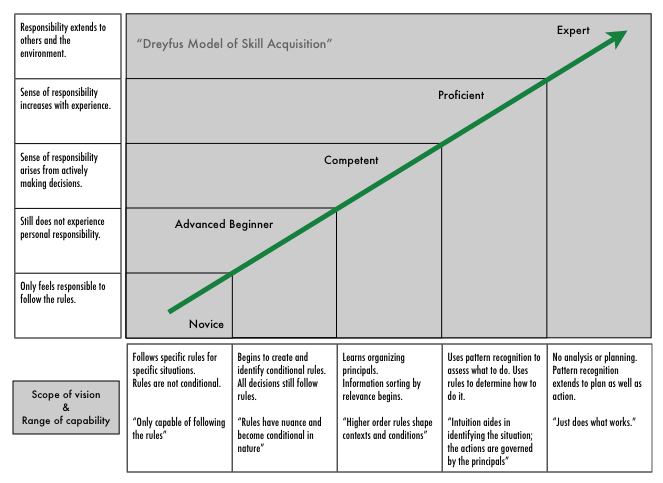knowledge, skill or wisdom gained through practice in some activity, or the doing of somethingWell, at least that is one definition. In contrast to knowledge, which is defined as
the state or fact of knowingSo somebody with experience has actually applied his wisdom. Recently I have come across several people where the gap between knowledge and experience created impediments.
I am sure you are aware of Shuhari. It is a Japanese martial arts concept that describes different stages of learning. Shuhari roughly translates to "first learn, then detach, and finally transcend." The "shu"-state is about learning fundamentals, techniques and heuristics. Once one progresses, he/she reaches the "ha"-state, which means "detachment from the illusions of self". If one achieves mastery, he is in the "ri"-state, where "there are no techniques or proverbs, all moves are natural, becoming one with spirit alone without clinging to forms".
Well, this is pretty abstract. You could maybe summarize it as "First you obey the rules, then you deviate a bit and finally you no longer think about them, it all feels natural." Personally, I prefer the Dreyfus-model.

Dreyfus Model - Credits: vitorpamplona.com
As you can see in this picture, the Dreyfus model knows five stages of skill acquisition: Novice, Advanced Beginner, Competent, Proficient and Expert. While the Beginner is just able to "follow the rules", the Expert "just does what works". In between, rules first have nuances and become conditional. Once competent, the person learns the rules behind the rules shaping context and conditions. Finally, intuition comes into play.
As far as the skills stretch, the sense of responsibility grows as well. But what does this have to do with Scrum? Well, a lot actually.
You know of course, that your team members will go through all of those stages and that the rest of the team should help each individual to proceed as quickly as sensible. But have you ever thought about yourself? In what stage are you? Don't be too hasty in your decision. Many people have a differing self-perception from other people's views. Especially Scrum Masters, who are usually quite self-confident and need a thick fur to enforce the rules of Scrum tend to consider themselves "Experts" once they start to see the principles behind Scrum. In truth, they are just Advanced Beginners, but they proclaim proudly to have mastered the art of Scrum. It is quite interesting to discuss nuances and the practical application with them (I admit that I like heated discussions). Unfortunately, quite often you quickly reach the point where the Advanced Beginners resort to the "because Scrum says so" argument. That's the minute where the discussions grow stiff and awkward, depending on the individual character.
Nobody can be an expert in all fields. On top of that, Scrum is just a framework with many holes. You need vast additional expertise to fill those professionally. Just think about things like:
- Coding practices
- Requirement elicitation
- Leadership
- Software deployment
- Organizational development
- Process engineering
- Moderation techniques
- Analysis methods
- And many more...
Now, if an Advanced Beginner starts discussing Scrum with experienced managers (who tend to be Competent or Proficient in their area of expertise), those quickly spot the lack of context and depth. Credibility and trust are lost. Sometimes Scrum is blamed for the incompetence afterwards (which usually just helps in political plays or fears for change, but nevertheless is harmful for the company's transition). This is a severe impediment. Without trust, Scrum cannot work.
I strongly recommend to create transparency for yourselves and the people you work with. Clearly state where your skills lie - and where you consider yourself a Novice. Don't rely on your own perception but ask others about their opinions. In each area of expertise, there are only few experts out there. Don't consider yourself one too light-headedly. Help others with less experience to develop themselves - for example by coaching them. Strive to improve yourself at every opportunity as well. Whenever you catch yourself not being able to explain something or resorting to "because ... says so"-answers, investigate further and look at the Dreyfus model again. Accept that there is always a "bigger fish" out there (which means a "better expert" of course). That's actually good, because otherwise you couldn't learn anything new anymore - what a boring life. If you believe yourself being a Scrum Expert, start filling in the holes. Trying to become an expert in all the fields will keep you busy a lifetime.
One last piece of advice: You can never become a Scrum Expert just by reading books. You have to apply your knowledge to real projects on a daily basis. Get your hands dirty!

